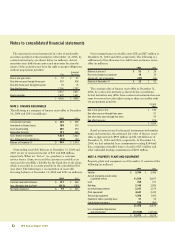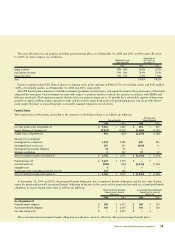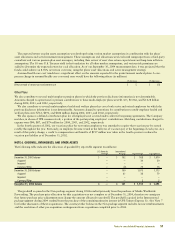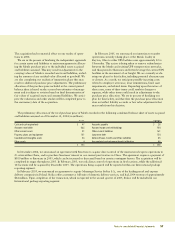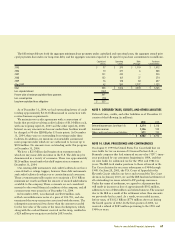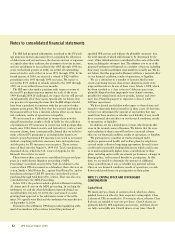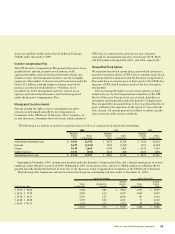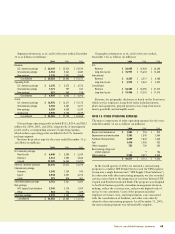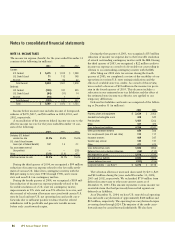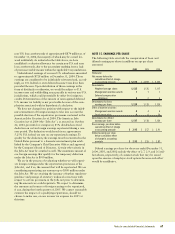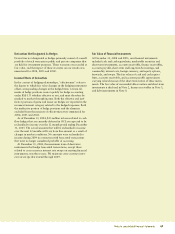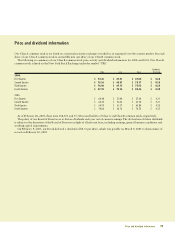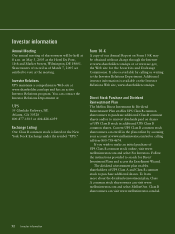UPS 2004 Annual Report Download - page 64
Download and view the complete annual report
Please find page 64 of the 2004 UPS annual report below. You can navigate through the pages in the report by either clicking on the pages listed below, or by using the keyword search tool below to find specific information within the annual report.
62 UPS Annual Report 2004
Notes to consolidated financial statements
The IRS had proposed adjustments, unrelated to the EV pack-
age insurance matters discussed above, regarding the allowance
of deductions and certain losses, the characterization of expenses
as capital rather than ordinary, the treatment of certain income,
and our entitlement to tax credits in the 1985 through 1998 tax
years. In the third quarter of 2004, we settled all outstanding
issues related to each of the tax years 1991 through 1998. In the
fourth quarter of 2004, we received a refund of $425 million
pertaining to the 1991 through 1998 tax years. We expect to
receive the $371 million of refunds related to the 1985 through
1990 tax years within the next six months.
The IRS may take similar positions with respect to some of
the non-EV package insurance matters for each of the years
1999 through 2004. If challenged, we expect that we will prevail
on substantially all of these issues. Specifically, we believe that
our practice of expensing the items that the IRS alleges should
have been capitalized is consistent with the practices of other
industry participants. We believe that the eventual resolution of
these issues will not have a material adverse effect on our finan-
cial condition, results of operations or liquidity.
We were named as a defendant in twenty-three now-dis-
missed lawsuits that sought to hold us liable for the collection
of premiums for EV insurance in connection with package ship-
ments since 1984. Based on state and federal tort, contract and
statutory claims, these cases generally claimed that we failed to
remit collected EV premiums to an independent insurer; we
failed to provide promised EV insurance; we acted as an insurer
without complying with state insurance laws and regulations;
and the price for EV insurance was excessive. These actions
were all filed after the August 9, 1999 U.S. Tax Court decision,
discussed above, which the U.S. Court of Appeals for the
Eleventh Circuit later reversed.
These twenty-three cases were consolidated for pre-trial pur-
poses in a multi-district litigation proceeding (“MDL
Proceeding”) in federal court in New York. In addition to the
cases in which UPS was named as a defendant, there also was an
action, Smith v. Mail Boxes Etc., against Mail Boxes Etc. and its
franchisees relating to UPS EV insurance and related services
purchased through Mail Boxes Etc. centers. That case also was
consolidated into the MDL Proceeding.
In late 2003, the parties reached a global settlement resolving
all claims and all cases in the MDL proceeding. In reaching the
settlement, we and the other defendants expressly denied any
and all liability. On July 30, 2004, the court issued an order
granting final approval to the substantive terms of the settle-
ment. No appeals were filed and the settlement became effective
on September 8, 2004.
Pursuant to the settlement, UPS has provided qualifying settle-
ment class members with vouchers toward the purchase of
specified UPS services and will pay the plaintiffs’ attorneys’ fees,
the total amount of which still remains to be determined by the
court. Other defendants have contributed to the costs of the settle-
ment, including the attorneys’ fees. The ultimate cost to us of the
proposed settlement will depend on a number of factors, including
how many vouchers settlement class members actually use. We do
not believe that this proposed settlement will have a material effect
on our financial condition, results of operations, or liquidity.
We are a defendant in a number of lawsuits filed in state
courts containing various class-action allegations under state
wage-and-hour laws. In one of these cases, Marlo v. UPS, which
has been certified as a class action in California state court,
plaintiffs allege that they improperly were denied overtime,
penalties for missed meal and rest periods, interest and attor-
neys’ fees. Plaintiffs purport to represent a class of 1,200
full-time supervisors.
We have denied any liability with respect to these claims and
intend to vigorously defend ourselves in these cases. At this time,
we have not determined the amount of any liability that may
result from these matters or whether such liability, if any, would
have a material adverse effect on our financial condition, results
of operations, or liquidity.
In addition, we are a defendant in various other lawsuits that
arose in the normal course of business. We believe that the even-
tual resolution of these cases will not have a material adverse
effect on our financial condition, results of operations, or liquidity.
We participate in a number of trustee-managed multi-
employer pension and health and welfare plans for employees
covered under collective bargaining agreements. Several factors
could result in potential funding deficiencies which could cause
us to make significantly higher future contributions to these
plans, including unfavorable investment performance, changes in
demographics, and increased benefits to participants. At this
time, we are unable to determine the amount of additional
future contributions, if any, or whether any material adverse
effect on our financial condition, results of operations, or cash
flows could result from our participation in these plans.
NOTE 11. CAPITAL STOCK AND STOCK-BASED
COMPENSATION
Capital Stock
We maintain two classes of common stock, which are distin-
guished from each other by their respective voting rights. Class
A shares of UPS are entitled to 10 votes per share, whereas Class
B shares are entitled to one vote per share. Class A shares are
primarily held by UPS employees and retirees, and these shares
are fully convertible into Class B shares at any time. Class B


